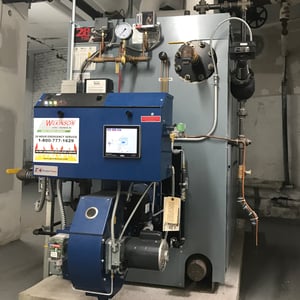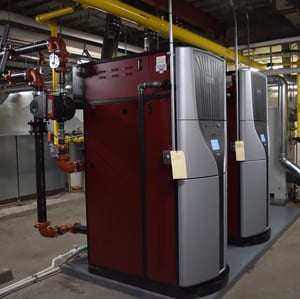Reliability. Safety. Cost-Effectiveness. There are many features to take into consideration when choosing the right boiler for your facility. But when the choice comes down to efficiency, longevity as well as the appropriate application, what do you do? Let’s look at the differences between condensing hot water boilers and cast iron hot water boilers.
Cast iron boilers have been around for over a century. If properly maintained, they are tried and  true. However, they cannot operate at efficiencies as high as its counterpart due to heat exchanger construction. While firing on natural gas, cast iron boilers typically operate in the 82% efficiency range whereas condensing boilers can operate at around 95% efficiency. A cast iron boiler typically will have a supply and return temperature differential of 20°F (180°F - 160°F) whereas a condensing boiler can sometimes more than double that… in the appropriate application. When the supply/return differential is substantial (feeding building fan coil units, heat pumps, etc.) then the condensing boiler option can be quite attractive. If it’s simply feeding warm temperature building loops, then the efficiencies will never be achieved by a condensing boiler due to the minimal supply/return differential. Thus a cast iron unit would render good efficiency as well as significant longevity.
true. However, they cannot operate at efficiencies as high as its counterpart due to heat exchanger construction. While firing on natural gas, cast iron boilers typically operate in the 82% efficiency range whereas condensing boilers can operate at around 95% efficiency. A cast iron boiler typically will have a supply and return temperature differential of 20°F (180°F - 160°F) whereas a condensing boiler can sometimes more than double that… in the appropriate application. When the supply/return differential is substantial (feeding building fan coil units, heat pumps, etc.) then the condensing boiler option can be quite attractive. If it’s simply feeding warm temperature building loops, then the efficiencies will never be achieved by a condensing boiler due to the minimal supply/return differential. Thus a cast iron unit would render good efficiency as well as significant longevity.
Trends are showing that condensing boilers are currently the popular choice because they are so  efficient. Condensing boilers can lower your energy bill and they also produce less emissions than other boiler styles. That said, cast iron boilers are proven to have a longer life span than condensing boilers. The biggest problem with cast iron boilers is cracking and leaking due to low return water temperatures. A cast iron boiler needs at minimum 140° return water temperature. These boilers also resist corrosion and when fitted with the proper burner and combustion control system, they can be quite efficient as well. Wilkinson can properly size any existing fire tube, water tube or cast iron boiler with a new burner from Power Flame Inc. or Limpsfield. All power burner installations are accompanied by the high-efficiency, linkageless Autoflame™ Combustion Management System unless otherwise specified.
efficient. Condensing boilers can lower your energy bill and they also produce less emissions than other boiler styles. That said, cast iron boilers are proven to have a longer life span than condensing boilers. The biggest problem with cast iron boilers is cracking and leaking due to low return water temperatures. A cast iron boiler needs at minimum 140° return water temperature. These boilers also resist corrosion and when fitted with the proper burner and combustion control system, they can be quite efficient as well. Wilkinson can properly size any existing fire tube, water tube or cast iron boiler with a new burner from Power Flame Inc. or Limpsfield. All power burner installations are accompanied by the high-efficiency, linkageless Autoflame™ Combustion Management System unless otherwise specified.
Burner options include the following:
- Low NOx
- Oil No. 2, No. 4, No. 6
- Gas, Natural and Propane
- Air, Pressure, Steam Atomized
- Combination Gas/Oil
- Register Type Forced Draft
We also install numerous manufacturers of condensing boilers. There are pros and cons to all producers of these boilers and we are happy to provide you with our expert analysis based on many years of installations.
Please remember that regardless of selected option, a maintenance plan should be implemented to ensure longevity and utmost efficiency.
Efficiency, Longevity and Application: which feature do you think is more important?
Comment Below!

